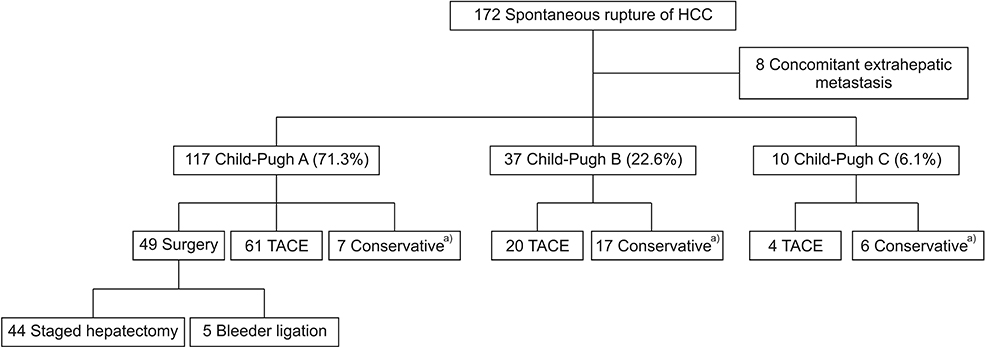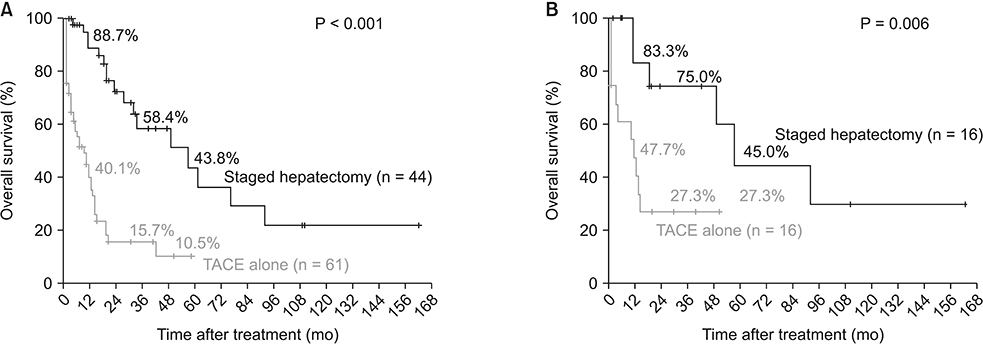Ann Surg Treat Res.
2019 Jun;96(6):275-282. 10.4174/astr.2019.96.6.275.
Staged partial hepatectomy versus transarterial chemoembolization for the treatment of spontaneous hepatocellular carcinoma rupture: a multicenter analysis in Korea
- Affiliations
-
- 1Department of Surgery, National Health Insurance Service Ilsan Hospital, Goyang, Korea.
- 2Department of Surgery, Severance Hospital, Yonsei University College of Medicine, Seoul, Korea. choi5491@yuhs.ac
- 3Department of Internal Medicine, Severance Hospital, Yonsei University College of Medicine, Seoul, Korea.
- 4Department of Surgery, Wonju Severance Christian Hospital, Yonsei University Wonju College of Medicine, Wonju, Korea.
- 5Department of Surgery, Gangnam Severance Hospital, Yonsei University College of Medicine, Seoul, Korea.
- 6Department of Internal Medicine, National Health Insurance Service Ilsan Hospital, Goyang, Korea.
- 7Department of Internal Medicine, Ajou University Medical Center, Ajou University School of Medicine, Suwon, Korea.
- 8Department of Internal Medicine, CHA Bundang Medical Center, CHA University, Seongnam, Korea.
- KMID: 2447951
- DOI: http://doi.org/10.4174/astr.2019.96.6.275
Abstract
- PURPOSE
The aim of this study was to identify the prognostic factors and compare the long-term outcomes of staged hepatectomy and transarterial chemoembolization (TACE) for patients with spontaneous rupture of hepatocellular carcinoma (HCC).
METHODS
This study is a multicenter, retrospective analysis of patients with newly diagnosed ruptured HCC. To compare overall survival between staged hepatectomy group and TACE alone group, we performed propensity score-matching to adjust for significant differences in patient characteristics. To identify prognostic factors, the clinical characteristics at the time of diagnosis of tumor rupture were investigated using Cox-regression analysis.
RESULTS
From 2000 to 2014, 172 consecutive patients with newly diagnosed ruptured HCC were treated in 6 Korean centers. One hundred seventeen patients with Child-Pugh class A disease were identified; of which 112 were initially treated with transcatheter arterial embolization (TAE) for hemostasis and five underwent emergency surgery for bleeder ligation. Of the 112 patients treated with TAE, 44 underwent staged hepatectomy, 61 received TACE alone, and 7 received conservative treatment after TAE. Those that underwent staged hepatectomy had significantly higher overall survival than those that underwent TACE alone before matching (P < 0.001) and after propensity score-matching (P = 0.006). Multivariate analysis showed that type of treatment, presence of portal vein thrombosis, pretreatment transfusion >1,200 mL, and tumor size >5 cm were associated with poor overall survival.
CONCLUSION
Staged hepatectomy may offer better long-term survival than TACE alone for spontaneous rupture of HCC. Staged hepatectomy should be considered in spontaneous rupture of HCC with resectable tumor and preserved liver function.
MeSH Terms
Figure
Cited by 1 articles
-
2022 KLCA-NCC Korea practice guidelines for the management of hepatocellular carcinoma
J Liver Cancer. 2023;23(1):1-120. doi: 10.17998/jlc.2022.11.07.
Reference
-
1. Lai EC, Lau WY. Spontaneous rupture of hepatocellular carcinoma: a systematic review. Arch Surg. 2006; 141:191–198.2. Aoki T, Kokudo N, Matsuyama Y, Izumi N, Ichida T, Kudo M, et al. Prognostic impact of spontaneous tumor rupture in patients with hepatocellular carcinoma: an analysis of 1160 cases from a nationwide survey. Ann Surg. 2014; 259:532–542.3. Chan AC, Dai JW, Chok KS, Cheung TT, Lo CM. Prognostic influence of spontaneous tumor rupture on hepatocellular carcinoma after interval hepatectomy. Surgery. 2016; 159:409–417.
Article4. Liu CL, Fan ST, Lo CM, Tso WK, Poon RT, Lam CM, et al. Management of spontaneous rupture of hepatocellular carcinoma: single-center experience. J Clin Oncol. 2001; 19:3725–3732.
Article5. Amin MB, Edge S, Greene F, Byrd DR, Brookland RK, Washington MK, et al. AJCC cancer staging manual. 8th ed. New York: Springer;2017.6. Lee HS, Choi GH, Kang DR, Han KH, Ahn SH, Kim DY, et al. Impact of spontaneous hepatocellular carcinoma rupture on recurrence pattern and long-term surgical outcomes after partial hepatectomy. World J Surg. 2014; 38:2070–2078.
Article7. Yang T, Sun YF, Zhang J, Lau WY, Lai EC, Lu JH, et al. Partial hepatectomy for ruptured hepatocellular carcinoma. Br J Surg. 2013; 100:1071–1079.
Article8. Kim JY, Lee JS, Oh DH, Yim YH, Lee HK. Transcatheter arterial chemoembolization confers survival benefit in patients with a spontaneously ruptured hepatocellular carcinoma. Eur J Gastroenterol Hepatol. 2012; 24:640–645.
Article9. Yoshida H, Mamada Y, Taniai N, Uchida E. Spontaneous ruptured hepatocellular carcinoma. Hepatol Res. 2016; 46:13–21.
Article10. Chan WH, Hung CF, Pan KT, Lui KW, Huang YT, Lin SY, et al. Impact of spontaneous tumor rupture on prognosis of patients with T4 hepatocellular carcinoma. J Surg Oncol. 2016; 113:789–795.
Article11. Zhu LX, Wang GS, Fan ST. Spontaneous rupture of hepatocellular carcinoma. Br J Surg. 1996; 83:602–607.
Article12. Clavien PA, Barkun J, de Oliveira ML, Vauthey JN, Dindo D, Schulick RD, et al. The Clavien-Dindo classification of surgical complications: five-year experience. Ann Surg. 2009; 250:187–196.13. Austin PC. A critical appraisal of propensity-score matching in the medical literature between 1996 and 2003. Stat Med. 2008; 27:2037–2049.
Article14. Vergara V, Muratore A, Bouzari H, Polastri R, Ferrero A, Galatola G, et al. Spontaneous rupture of hepatocelluar carcinoma: surgical resection and long-term survival. Eur J Surg Oncol. 2000; 26:770–772.
Article15. Lai EC, Wu KM, Choi TK, Fan ST, Wong J. Spontaneous ruptured hepatocellular carcinoma. An appraisal of surgical treatment. Ann Surg. 1989; 210:24–28.
Article16. Monroe EJ, Kogut MJ, Ingraham CR, Kwan SW, Hippe DS, Padia SA. Outcomes of emergent embolisation of ruptured hepatocellular carcinoma in a western population. Clin Radiol. 2015; 70:730–735.
Article17. Han XJ, Su HY, Shao HB, Xu K. Prognostic factors of spontaneously ruptured hepatocellular carcinoma. World J Gastroenterol. 2015; 21:7488–7494.
Article18. Moris D, Chakedis J, Sun SH, Spolverato G, Tsilimigras DI, Ntanasis-Stathopoulos I, et al. Management, outcomes, and prognostic factors of ruptured hepatocellular carcinoma: a systematic review. J Surg Oncol. 2018; 117:341–353.
Article19. You DD, Kim DG, Seo CH, Choi HJ, Yoo YK, Park YG. Prognostic factors after curative resection hepatocellular carcinoma and the surgeon's role. Ann Surg Treat Res. 2017; 93:252–259.
Article20. Liu L, Wang Z, Jiang S, Shao B, Liu J, Zhang S, et al. Perioperative allogenenic blood transfusion is associated with worse clinical outcomes for hepatocellular carcinoma: a meta-analysis. PLoS One. 2013; 8:e64261.
Article21. Kwon AH, Matsui Y, Kamiyama Y. Perioperative blood transfusion in hepatocellular carcinomas: influence of immunologic profile and recurrence free survival. Cancer. 2001; 91:771–778.22. Kuroda S, Tashiro H, Kobayashi T, Oshita A, Amano H, Ohdan H. No impact of perioperative blood transfusion on recurrence of hepatocellular carcinoma after hepatectomy. World J Surg. 2012; 36:651–658.
Article23. Zhu RX, Seto WK, Lai CL, Yuen MF. Epidemiology of hepatocellular carcinoma in the Asia-Pacific region. Gut Liver. 2016; 10:332–339.
Article
- Full Text Links
- Actions
-
Cited
- CITED
-
- Close
- Share
- Similar articles
-
- Rupture of hepatocellular carcinoma after transcatheter arterial chemoembolization: A case report
- Ruptured Massive Hepatocellular Carcinoma Cured by Transarterial Chemoembolization
- Hepatobronchial Fistula and Lung Abscess after Transarterial Chemoembolization
- A case of spontaneous rupture of hepatic angiomyolipoma
- Complications Related to Transarterial Treatment of Hepatocellular Carcinoma: A Comprehensive Review



